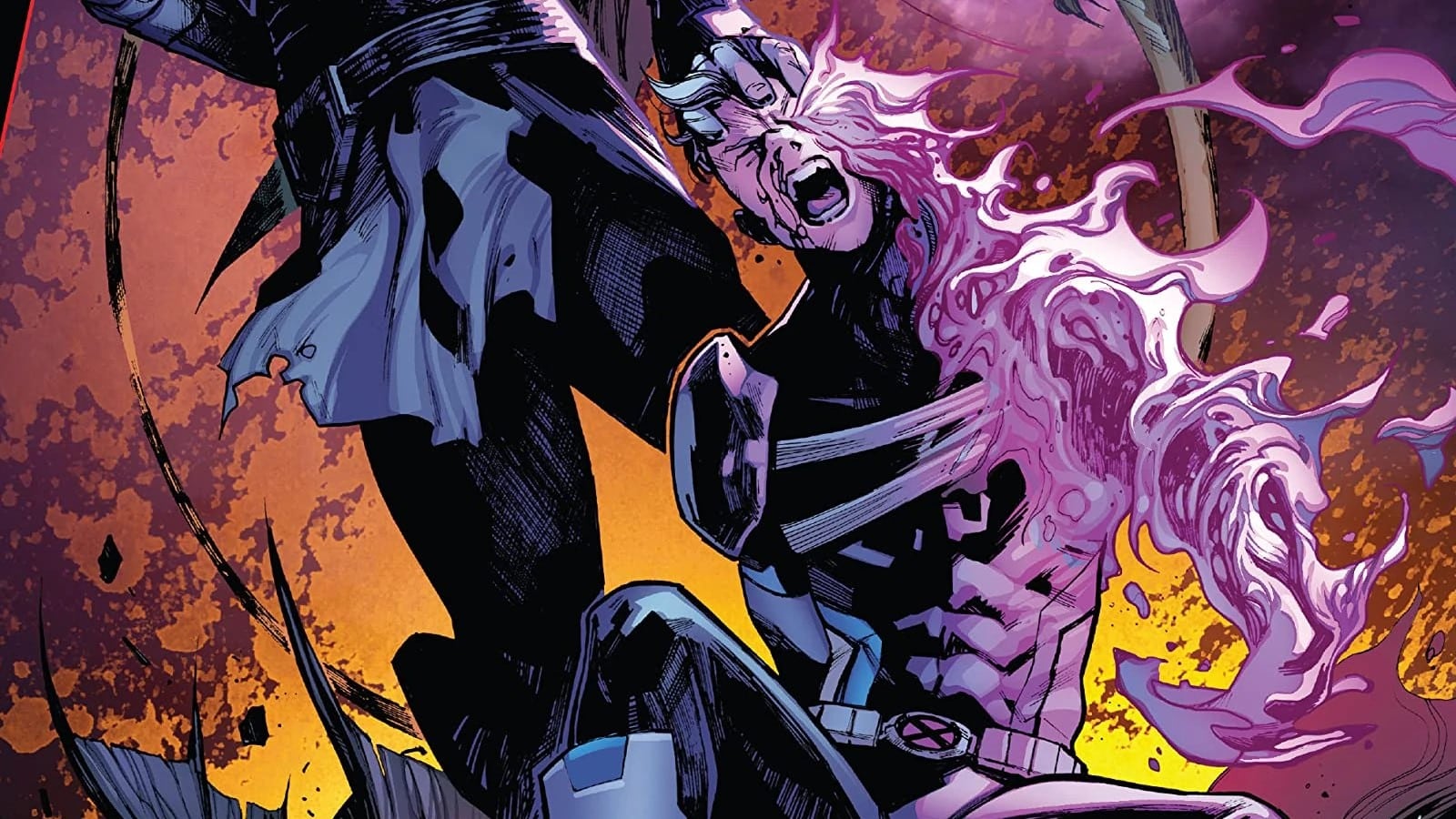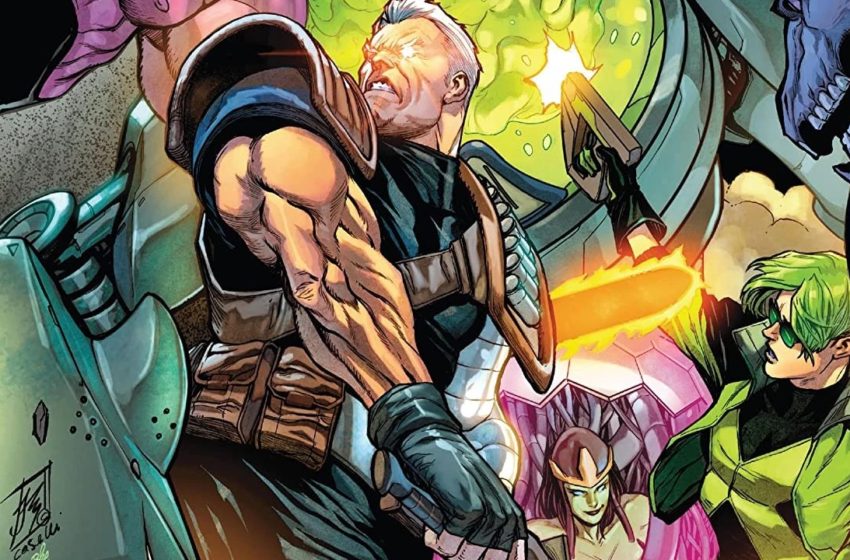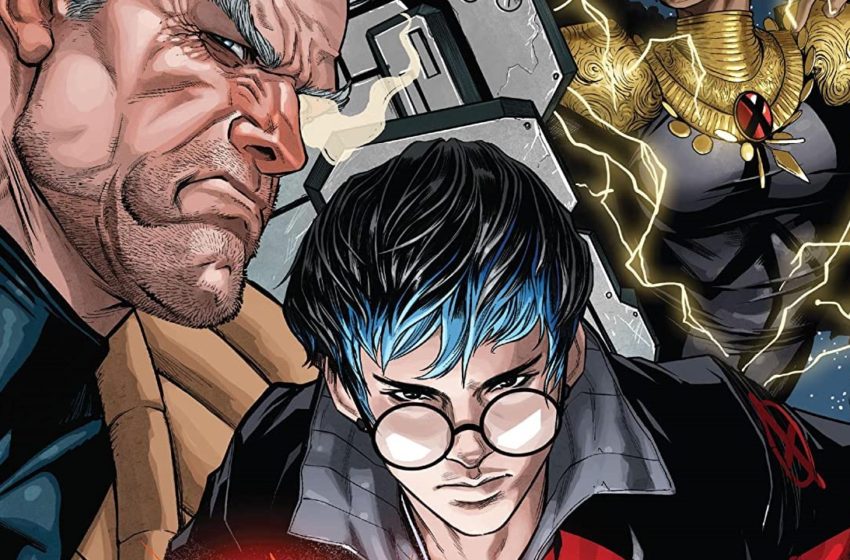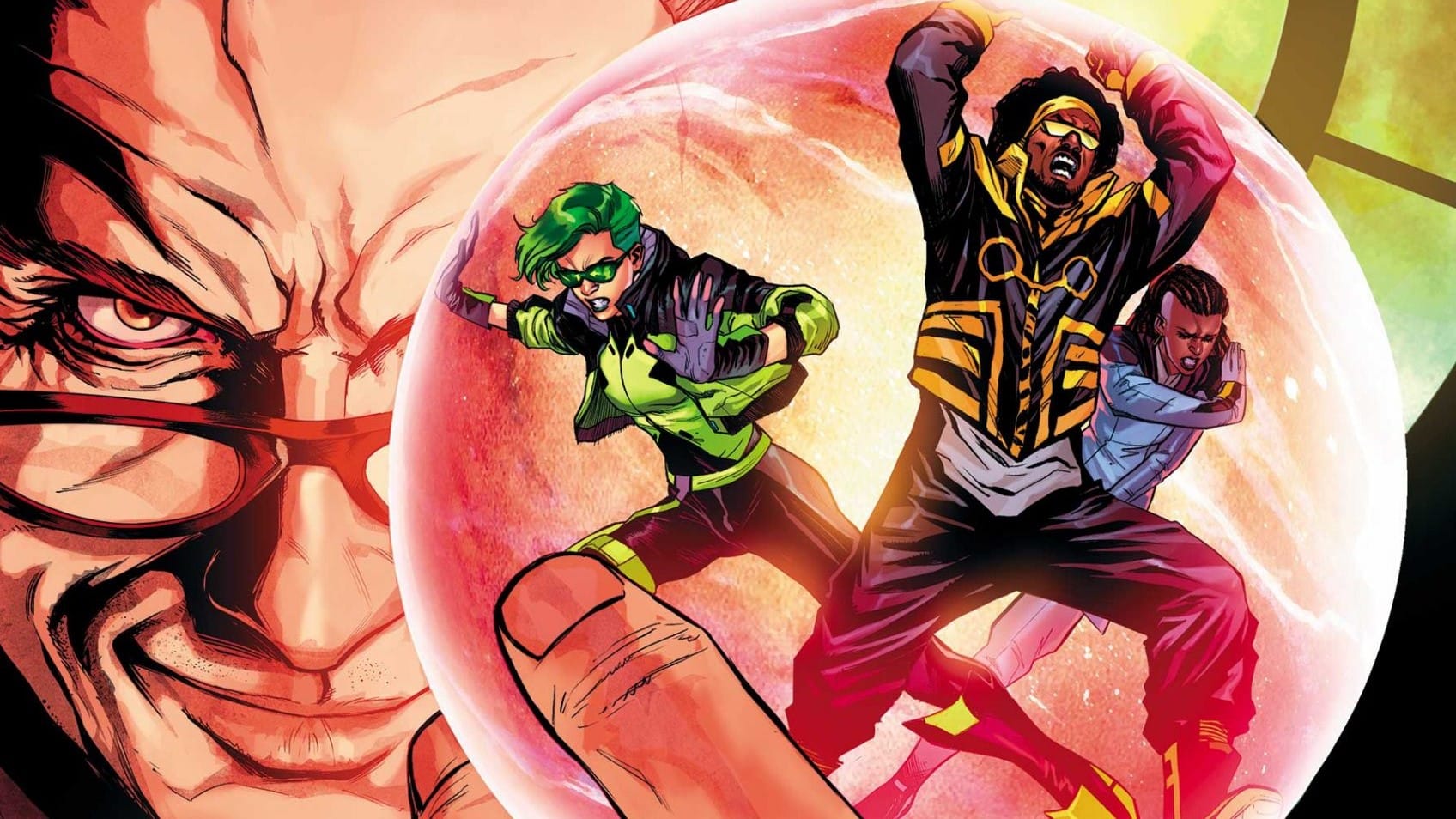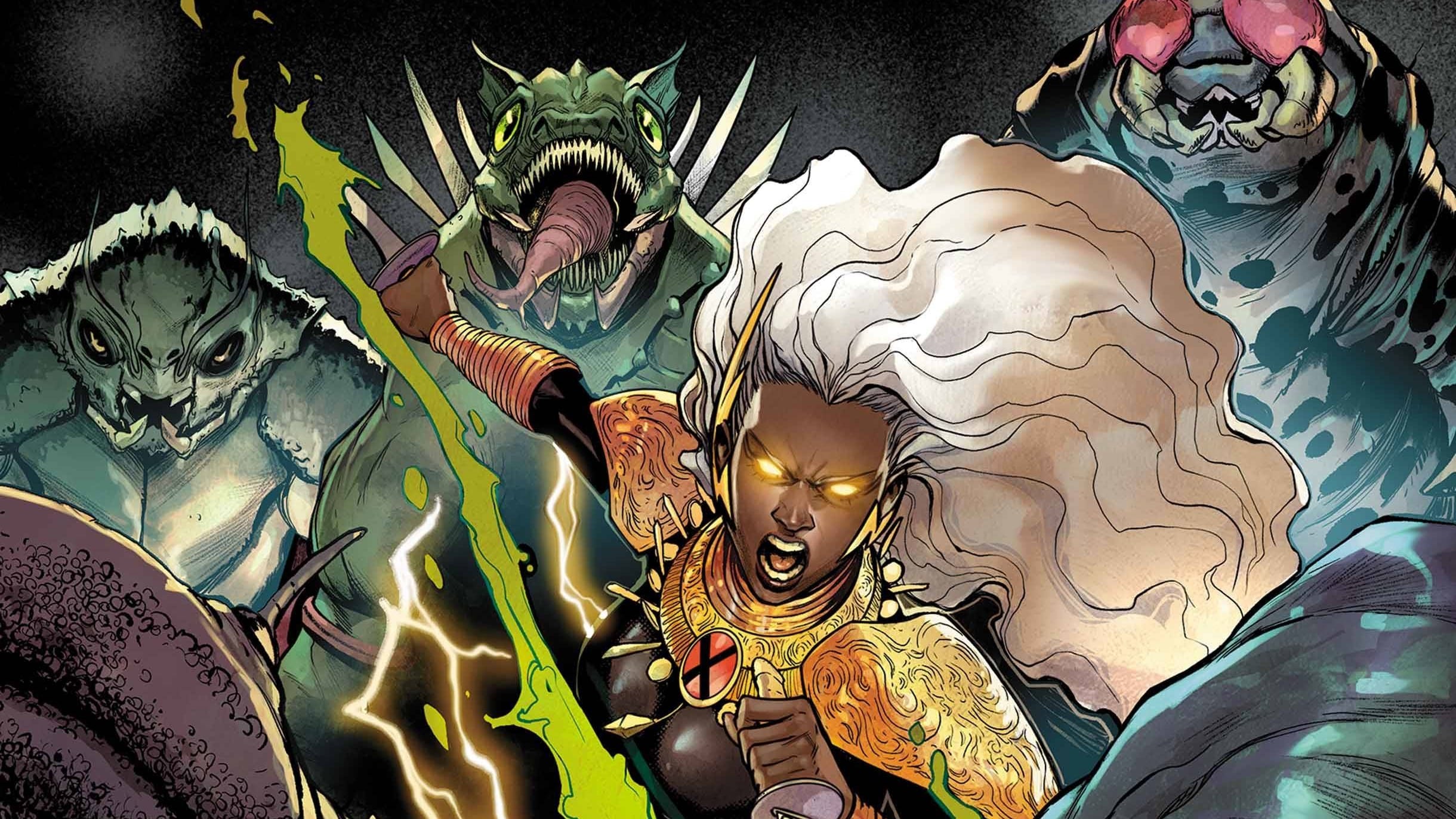As King In Black winds down, S.W.O.R.D. makes sure Krakoa is kept safe. Surely this will end well. Al Ewing, Valerio Schiti, Marte Gracia and Ariana Maher deliver S.W.O.R.D. #4.
Zach Rabiroff: Well, I’m out of the shower, and I finally managed to wash all of this disgusting Knull goop out of my hair. Boy, I sure hope nothing in today’s comics gets any Knull goop in my hair, because that stuff is awful. Oh, hey, Nola, what’s happening in S.W.O.R.D. this week?
Nola Pfau: You’re not gonna like it…
Symbiout of His League

ZR: For the past two months, I’ve been keeping a wary eye on this Knull subplot the way I keep an eye on the mysterious rash developing on my forearm, quietly hoping that it will just go away on its own and not require my actual attention. But alas, inevitably, here we are in the urgent care clinic, and I suppose we have no choice but to write about King in Black this week. And you know, all things considered, it could be worse. Sure, given the choice I’d have preferred to stay focused on storylines a little more germane to this team than Dark Baby Slime Cable, but Al Ewing has always been uniquely skillful at turning mandated crossovers to his own advantage: see, for instance, the way he used the universal destruction of Secret Wars to cap off the development of his version of Loki, or his use of the otherwise interminable Avengers: Standoff! as a turning point for his two Avengers series.
In this case, he turns what is ostensibly a battle between the SWORD team and their possessed teammate hereby dubbed CabKnull [Ed. note: Absolutely not] into a showdown between Eden Fesi and his own inner demons. That’s not the most innovative trope in comics (there’s really not much to distinguish it from one of those battles against walking metaphors like D’Spayre that deadline-crunched writers are so often fond of), but here I think it works as a resolution to some of the internal conflicts introduced for Eden last issue. CabKnull’s gambit is to undermine Manifold’s confidence by taunting him with his own persistent sense of inferiority – isn’t he just the poor man’s Gateway, after all?
But for Eden, it turns out, the fact that there is always a mutant better and stronger than himself is not a bug but a feature: it’s a sense of continuity and assurance that comes from being a part of a larger whole that is mutantkind. So what we have here is an answer to the question posed last issue about whether Eden, having left his Outback home, still has a firm ground to stand on. He does, and that ground is Krakoa and the mutant solidarity it represents.
NP: Yeah. I’m actually surprised that, even with the whole “company mandated crossover” thing, and even with the big events that X-Men seem to have been forced to participate in, Ewing really manages to turn in a solid story in itself; we know that nothing about this event will matter in the long run, so he takes the time to work on character beats and team dynamics—how they handle this extremely dumb event is what matters.
It reminded me extremely of the Empyre: X-Men mini that I covered with Allison Sencal; some entirely less-important bull$%!+ that no one on Krakoa cares about attempting to make itself relevant. There, we got the Explodey-Kid arc where he got to talk to his own zombie self, and here we get bits like you described, the idea that Eden takes comfort in the idea of community, and in the idea of individuals even more powerful than himself. Frankly, I love that idea, because if there’s one thing I relate to, it’s the idea that if there are more important people in a room, I can quietly be left to my own devices.
ZR: I agree: it’s a beautiful idea, this notion that there is something liberating in not needing to be uniquely capable, because you’re as much a part of a society as you are an individual standing on your own. It harkens back to that idea of mutant machines that we saw in issue #1, in which units of mutants can produce a synergistic effect bigger than the sum of their parts. As long as there are bigger, badder mutants to back him up, Eden can just be Eden, and that gives him the freedom it takes to win.
Working Ourselves Into A Frenzy

ZR: And while we’re talking character beats in this sequence, can we spare a moment for the brief but memorable moments given to Joanna Cargill? I love Ewing’s little nod to her unresolved feelings for Scott Summers, one of the weirder plot beats to emerge out of Mike Carey’s consistently weird run on X-Men: Legacy. It’s not something I ever expected someone to dredge up again, but it feels so obvious and right here: of course Frenzy would think about the happiness she never had every time she sees Cable as a teammate, and of course (being the kind of hardened, experienced soldier she is) she’d keep that pain quietly to herself. She’s walking around with a lot of open wounds, and even in the short couple of pages she gets here, I appreciate seeing them recognized and remembered.
NP: Y’know, that Carey run is real popular, but I gotta say it never worked for me. Something about his beats don’t click, and he’s not great about the way he treats female leads in his books. I realize many people will disagree with me, but here’s the thing: I’m always right.
The thing I love about Frenzy’s arc here is the absolute bluntness of it. She gets the first page in the issue, you know she’s stuck, but you also know she’s gonna bust free, and it’s just a case of when. That first page, though, there’s something about her internal monologue that really works; it’s like it’s a testament to the power of spite seeing a person through difficulty, and I gotta say it really worked for me. I’ve been in situations where the only way through was “nah, hurt them back harder.” When she finally does bust out and turn the tables, it’s satisfying as hell.
ZR: Nola, as our readers will know, is always right, and never moreso than when talking about Carey’s fan-favorite run, which also left me distinctly cold. Maybe it’s because, given the choice between Mopey Romantically Tortured Rogue and Spunky Outback Rogue, I’ll choose the latter every time.
[Ed. note: Well since we are dropping hot Carey takes, I love his X-Men run and will defend it forever, but I also agree with Zach & Nola that X-Men: Legacy is missing a spark.]
But back to this series: I also love that opening sequence, and among other things, it’s another showcase for colorist Marte Gracia, the unsung hero of this book. The way the whole page is built on layers of black shading into oppressively heavy purples somehow feels like a visual emblem of depression in a way that verbal description could never fully capture. And contrast it was the blazing orange of Manifold’s captured sun later in the issue, or the rainbow lights of Wiz Kid’s techno dance party. Every scene has a mood and tone unique to itself, and as much as Schiti’s linework is a key part of that, it’s the color that really carries the artistic weight here.
And speaking of colorful moods: how do you think our deposed Prince in Black Cable is holding up in the wake of this embarrassing spectacle?
NP: I dunno, I think it was a pretty disarming experience for him. I suspect he might be a little more hands-off in the future, you know? I mean I bet he’d give his left arm to undo all of it.
ZR: I’d say I’ve really got to hand it to you, but it just feels tasteless under the circumstances. [Ed. note: I hate both of you.]
I’ll add, though, that I did enjoy Magneto’s paternal, post-battle pep talk to the poor kid. Erik, as we know, is the X-Men’s most notorious bad dad this side of Charles “If They Ain’t a Child Soldier They’re No Good to Me” Xavier, but I have to admire his consistent dedication to it. That said, since we’ve seen some rumblings that Kid Cable’s story might soon be coming to an end, it’s an odd beat of failure to leave him on. But maybe that’s just cueing up on more plot for Gerry Duggan and Phil Noto to play with before his era wraps up.
NP: Well, we don’t know that his story’s coming to an end, just that his book is. That previewed final cover does hint at possible directions but it wouldn’t be the first time we’ve been misdirected by PR.
The thing that’s interesting to me about it is that this version of Cable first established himself through the murder of his own older adult version. This act was simply accepted, even in light of the concept of Krakoan resurrection. I can, obviously, understand why they wouldn’t bring him back, given that young Cable is still here, but it also seems strange that, as a whole, they’re so blase about it. I wonder if it’ll get addressed at some point, whether in the final issues of his solo book or here.
ZR: In a lot of ways, Cable (whether this version or his predecessor) poses a problem to Krakoa-era writers because he’s so rooted in a vision of X-Men from a prior epoch. He represents a time when the focus of the franchise was on a multiplicity of dystopic futures, time travel complexities, and arcane continuity considerations. Those are things that, for better and worse, have been largely and deliberately discarded in favor of something more forward-facing, and it leaves a character like Nathan, especially in this iteration, seeming even more like a man out of time. To that end, I appreciate that we’ve been getting any recognition of him as an actual person with background and emotions, instead of just an irritating fossil of pre-HoX PoX comics to be buried as soon as it was feasible. And speaking of fossils…
Cortez the (Flatscan) Killer

NP: Props to Cortez for really giving it his all here. I felt like his appearance in this issue was very revealing, really gave us a look at what’s going on inside.
I think Magneto’s scene here is meant to be ominous, like he’s falling under the sway of Cortez’s nonsense, but I don’t think I buy the implication, you know? I think he’s got plans, certainly, but I suspect that he’s going to outmaneuver whatever Fabian wants easily.
ZR: I couldn’t agree more. I mentioned back in our discussion of issue #1 that I suspected Magneto’s burned-out former Acolytes were largely underestimating him in this series. I think that remains true here, and whatever he’s up to in his little Hamlet and Yorick role playing session with the skull of Fabian Cortez, my guess is that he’s relying on the inherent willingness of those around him to think he’s just an old man ready to be duped. But while it might be possible to get Grandpa Erik to give his social security number to a fake customer service email, trying to outwit him in mutant politics is another matter, especially for a cut-rate former lackey like Cortez. Fool him once, shame on you…
I wonder, though, just what Cortez’s plan really is? We know enough to be aware that it involves an amendment to the second law of Krakoa (“Murder No Man”), and that Cortez would no doubt take great glee in some judicially-sanctioned revenge on flatscans. But what do we think Magneto is planning to get out of backing his measure? He’s not in need of any more power, and given the worshipful attitude of the Krakoan masses toward him back in X-Men #1, I’m skeptical that he needs to grow his clout among the radical intelligentsia. So as it stands, the nature of his play is a mystery to me.
One additional note here: if we assume Cortez is sincere in his proposal, it actually represents something of a leap for him. Back in the day, his gestures toward mutant radicalism were largely just self-interested attempts to position himself at the head of Magneto’s clique, something that separated him from his more sincerely dedicated rival Exodus (see, for instance, Cortez’s attempt to kidnap Magneto’s erstwhile granddaughter Luna in what now turns out to be a hilarious case of mistaken identity that I’m sure everyone laughs about when they’re on speaking terms back in Avengers/X–Men: Bloodties). If he really hates the humans just on principle now, it’s actually progress for him. Kind of.
NP: Y’know, your mention just now makes it occur to me that that’s two X-Men #1s involving people who worship Magneto. Either way, before Cortez can enact his plan, he needs to be resurrected first, and Magneto definitely did not seem to care overmuch about that, prioritizing him last in his clean up of this whole mess.
That brings us to the Five, who are busy this issue arguing with Brand about the details of her plan and her lack of ability to consult with other people. I really liked this bit; it felt like it really went against the idea of the lone superspy who can trust no one in a very effective way. If X-Men is about challenging things and moving forward, I feel like it succeeded in that aspect here; Brand has something to think about going forward.
ZR: Hope’s interrogation certainly manages to puncture the aura of invincibility around Brand’s plan, and Ewing does a great job capturing Brand’s combination of resentment and bemusement in the face of the younger woman’s withering critique. Bringing up Mentallo is a low blow, to be sure, and maybe the vulnerability of Shi’ar space is just a necessary risk. But the lack of a full set of DNA samples certainly seems like a deal-breaker for the Krakoan project. What, as Hope asks, is the point of this new equal mutant society if some mutants turn out to be more expendable than others after all? And exactly who is making the determination here? Brand mumbles some spy-speak about need-to-know information and secret loyalties, but who actually originated Protocol V, and how might that affect the chosen few whose survival is guaranteed? We don’t know, and neither does the Five or the SWORD team, and therein lies the risk of Abigail Brand’s particular variety of loyalty-free employment. It spares her from having to put her trust in anybody or anything, but the consequence is that no one has a reason or an inclination to trust her in turn.
Her defense also forces her into some pretty uncomfortable postures, like conflating humans and mutants (despite her own mutant identity), and telling the one-time savior of mutantkind that “You’re all Earthers to me.” That’s the kind of thinking that once made her such a perfect match for self-hating mutant par excellence Hank McCoy, and it represents precisely the opposite of the attitude we saw from Manifold in this same issue. Manifold knows where he stands and who his people are. Brand? She’s got a lot of thinking left to do.
NP: Brand’s stance here very specifically evokes a kind of “boths sides” attitude we’ve seen a lot in real world politics. There’s a dismissiveness to her tone that Hope utterly takes apart, and I really liked that beat specifically; Hope is not a person who enjoys being spoken down to even a little bit.
It seems that neither is Wiz Kid, who responds to Brand trying to bench him by turning Mentallo’s Think Tank into an actual transformer.
ZR: I really thought that just introducing Mentallo riding astride an absurdly phallic tank was as good as this was going to get, but boy did I underestimate Ewing and Schiti’s willingness to just go full-on borderline Hasbro copyright infringement. And let me be clear: I love this. Think Tank (which is already a great Transformers name!) looks like a giant, pink, mechanical version of Spider-Ham, with its gun turned into an adorable snout. And I hope that its love of dance music persists as its defining character trait for the remainder of its appearances. You know what, screw it: put this robot on the X-Men. Put it at the front of the resurrection queue. Give it a Marvel Legends action figure. I’m going all-in for Team Think Tank.
NP: You raise an excellent point, actually—Marvel figures are made by the same people who already own the Transformers, and who indeed just released a special X-Men Transformer! Hasbro can TOTALLY MAKE THIS HAPPEN.
X-Traneous Thoughts

- How much do I love that Fabian Cortez’s ponytail remains attached to his otherwise bare skull, finally confirming my longtime theory that he was wearing an extremely 1990’s adamantium hairpiece all along.
- That final data page feels like…not the best use of the space.
- Hey, at least it promises fun with Amelia Voght, who I prefer to believe has actually been misting her way through every scene in this series so far, and just being very quiet about it.
- This single printing of her last name is as loud as she’s been since the series debut.
- Krakoan reads: Murder

